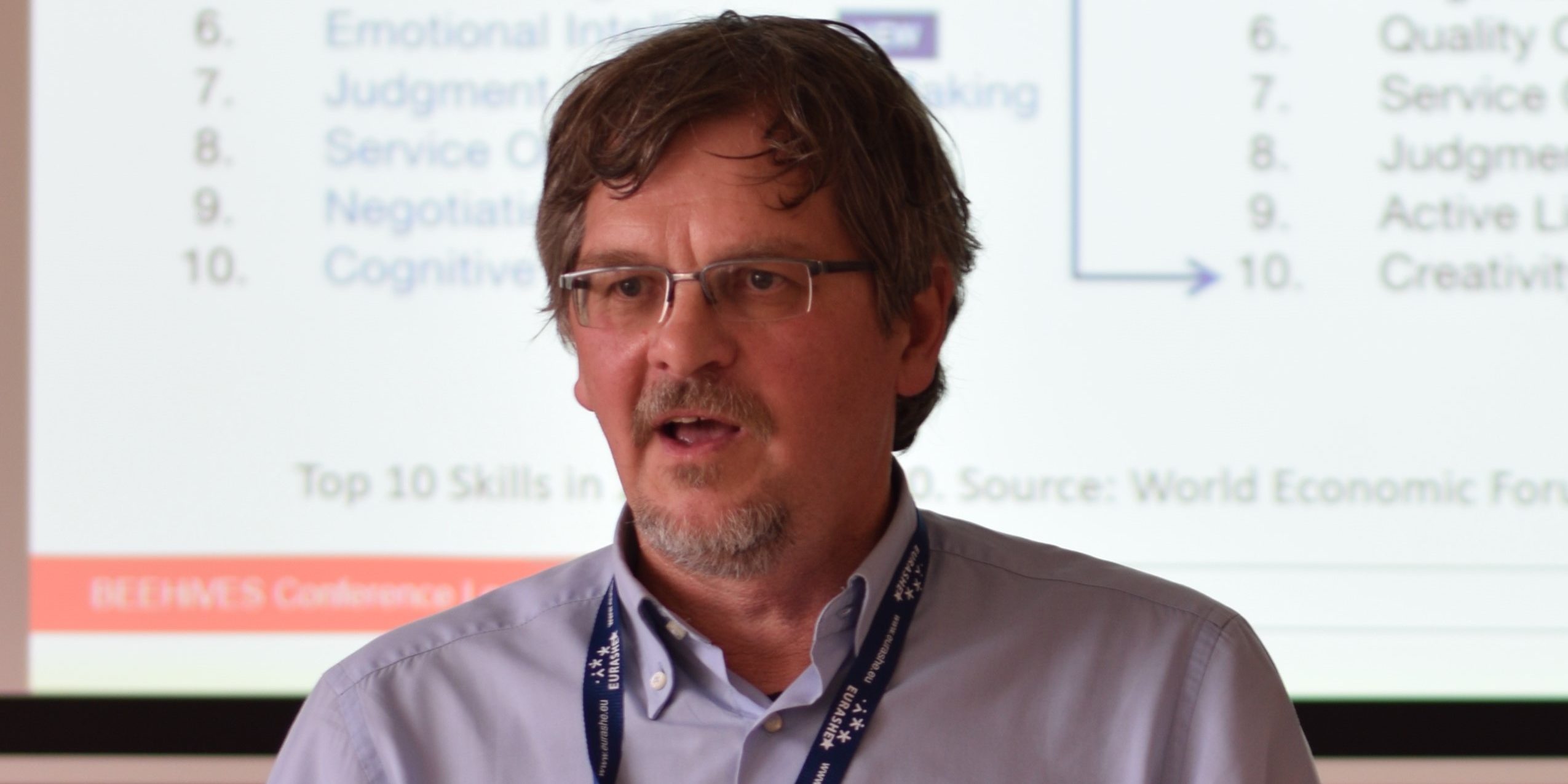With 15 years of experience on his back as a senior lecturer and researcher at leading academic institutions, Mr. Raimund Hudak is the Project Manager of Duale Hochschule Baden-Württemberg (DHBW) for several European-wide research programmes. He manages the research and collaborates with other campuses within DHBW, bringing in the industry perspective and knowledge of change management, a key requirement for the transition towards Industry 4.0.
Mr. Hudak stresses that “VET and Higher education institutions have a fundamental role in empowering future professionals in advanced manufacturing to shape their own future by helping them develop the key transferable skills and attitudes. These skills and attitudes are needed for continuously upskilling the core professional competencies. With our Industry 4.O frameworks and platform we will build a solid foundation and fruitful basis for exploring good practices of educating the future workforce in a context of the fourth industrial revolution.”
What are your expectations for EXAM 4.0, a disruptive pilot initiative for European Vocational Education and Training (VET)?
It is important that we understand the current situation in the different industry sections and identify skills mismatches in order to adapt curriculum design to the Industry 4.0. Indeed, it is crucial that our qualifications adapt to the fast-changing needs of the industry.
What activities are you carrying out within the EXAM 4.0 project?
DHBW is leading the desk research on future trends in Europe, to identify what needs to be transferred to the industry and make this new industrial revolution a success in Europe. The research that has been carried out for the last five months identifies that Smart Manufacturing strategies and business model changes will help meet increasingly complex customer expectations. With our research work we will match education and training with the Industry 4.0 requirements: a better qualification with the right competencies. The report [to be published in the upcoming months] highlights opportunities for the business community to contribute to the development and growth of the future workforce, focusing on suggested best practices to reach and support our students in Europe.
Read more about EXAM 4.0 prospective project results and the Learning Dialogues strand here.
The project is named Excellent Advanced Manufacturing 4.0. What does “excellence” mean to you?
Today’s competitive and globalized market conditions force organizations not only to respond reactively to survive prevailing challenges, but also to seek long-term success by achieving excellence in their business. The advanced digital technologies known as Industry 4.0 have emerged to offer new approaches for dealing with complexity and improving productivity. This leads to operational excellence. Deploying the right combination of technologies, manufacturers can boost speed, efficiency, and coordination and even facilitate self-managing factory operations. All this will keep us at the front-end of innovative manufacturing and operations, sustaining Europe’s competitiveness in the world.
Why is Advanced Manufacturing 4.0 a strategic sector to further develop VET?
Industry 4.0 is reshaping manufacturing. Companies around the globe recognize the opportunities that it creates, many of them and mainly SMEs are struggling to revamp their plants and operations to capture the benefits and create value. The existing mismatch between youth skills and employer needs threatens to become even wider as Industry 4.0 transforms business and jobs faster than workers can adapt to it. In the future, workers with VET qualifications must understand the complexity and interconnection of processes within companies. The new technologies of intelligent production or advanced manufacturing involve a fundamental change in the division of work between humans and machines. This will bring about substantial consequences for the tasks, quality of work and competencies of employees. It is upon us in the consortium, to understand what skills and competences are needed in the future.
What is the role of cooperation in achieving such objectives?
Our students are not fully equipped for the work that needs to be done in a new Industry 4.0 environment. Improving their potential employment outcomes demands indeed that businesses, governments and other key players cooperate to align educational initiatives, workforce-development programs and public policy. With our research work and our platform of VET excellence, we want to provide a service to our strategic partners, address the obligations and opportunities that business leaders and institutions are facing. We also outline recommendations that, taken together – as a coordinated action between industry, governments and VET institutions, as well as policy-makers, young people and other stakeholders – create a strong network for advancing the cause.
This transformation of the work environment will change the job profiles and therefore requires employees to be outfitted with a wide range of competencies. We at DHBW have a close collaboration with 9,000 industry partners. Students receive education at our campuses but also in-company training. The adaption of our dual study programmes and the future development of an Industry 4.0 Curriculum is crucial for us as an institution, but also for our industry partners and students. Industry 4.0 curriculum development must reflect and discuss future trends, qualification requirements, competences and skills development, and qualification opportunities. Therefore, our EXAM 4.0 study focuses on the requirements for professional training and further education, specifically in technical professions and academic education in the area of Advanced Manufacturing.

Discover other initiatives by DHBW
Through the research studies MicroHe and OEPass, DHBW is looking into new learning pathways. Continuous learning through alternative credentials (certificates, digital badges, micro-credentials) is a means to overcome skills mismatches, increase the efficiency of higher education systems, encourage innovation in provision, and thereby reach new learners, including those from disadvantaged backgrounds.
Higher education institutions have a key role in offering alternative credentials, which can help learners acquire new skills, and update their existing skills in changing labour markets. Innovations in learning pathways and learning environments in higher education institutions are a pre-condition to better accommodate the needs of a wider range of learners. This does not imply a replacement of traditional degrees, but rather complementing these with new and shorter forms of provision that fit the needs of a wider range of learners, including working adults. Microcredentials play an important role in the I4.0 skills development.
Encouraging and supporting higher education institutions in providing these modular and continuous learning opportunities is a strategic aim, which the European Commission wants to foster as part of the creation of a European Education Area by 2025.
An interview by EARLALL. With the support of DHBW. The views and opinions expressed in this article are those of the authors and do not necessarily reflect the official policy or position of any official body or the EXAM 4.0 project itself.



